Related Research Articles
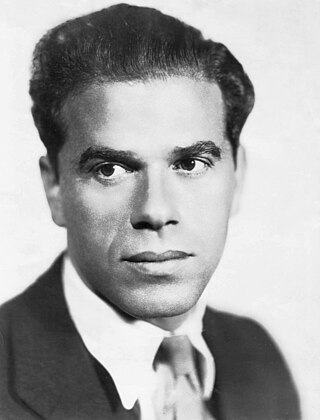
Frank Russell Capra was an Italian-American film director, producer, and screenwriter who was the creative force behind several major award-winning films of the 1930s and 1940s. Born in Italy and raised in Los Angeles from the age of five, his rags-to-riches story has led film historians such as Ian Freer to consider him the "American Dream personified".

Sergeant York is a 1941 American biographical film about the life of Alvin C. York, one of the most decorated American soldiers of World War I. Directed by Howard Hawks and starring Gary Cooper in the title role, the film was a critical and commercial success, and became the highest-grossing film of 1941. In 2008, Sergeant York was selected for preservation in the United States National Film Registry by the Library of Congress as being "culturally, historically, or aesthetically significant".

Becky Sharp is a 1935 American Technicolor historical drama film directed by Rouben Mamoulian and starring Miriam Hopkins, who plays the eponymous protagonist. She was nominated for the Academy Award for Best Actress. Other supporting cast were William Faversham, Frances Dee, Cedric Hardwicke, Billie Burke, Alison Skipworth, Nigel Bruce, and Alan Mowbray.

The 2nd Armored Division was an armored division of the United States Army. The division played important roles during World War II in the invasions of Germany, North Africa, and Sicily and in the liberation of France, Belgium, and the Netherlands. During the Cold War, the division was primarily based at Fort Hood, Texas, and had a reinforced brigade forward stationed in Garlstedt, West Germany. After participation in the Persian Gulf War, the division was inactivated in 1995.

Hans Georg Conried Jr. was an American actor and comedian. He was known for providing the voices of George Darling and Captain Hook in Walt Disney's Peter Pan (1953), Snidely Whiplash in Jay Ward's Dudley Do-Right cartoons, Professor Waldo P. Wigglesworth in Ward's Hoppity Hooper cartoons, was host of Ward's live-action "Fractured Flickers" show and Professor Kropotkin on the radio and film versions of My Friend Irma. He also appeared as Uncle Tonoose on Danny Thomas' sitcom Make Room for Daddy, twice on I Love Lucy, and as the Mad Hatter along with Daws Butler, Dolores Starr, Stanley Adams, Francis Condie Baxter and Cheryl Callaway in The Alphabet Conspiracy (1959).
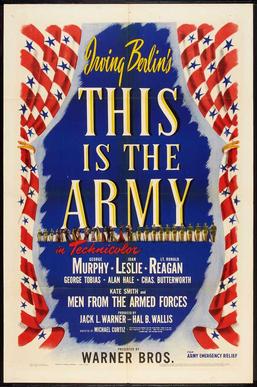
This Is the Army is a 1943 American wartime musical comedy film produced by Jack L. Warner and Hal B. Wallis and directed by Michael Curtiz, adapted from a wartime stage musical with the same name, designed to boost morale in the U.S. during World War II, directed by Ezra Stone. The screenplay by Casey Robinson and Claude Binyon was based on the 1942 Broadway musical written by James McColl and Irving Berlin, with music and lyrics by Berlin. Berlin composed the film's 19 songs, and sang one of them.
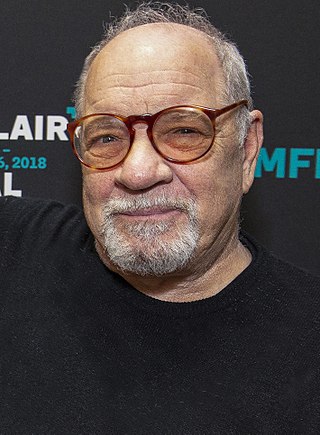
Paul Joseph Schrader is an American screenwriter, film director, and film critic. He first became known for writing the screenplay of Martin Scorsese's Taxi Driver (1976). He later continued his collaboration with Scorsese, writing or co-writing Raging Bull (1980), The Last Temptation of Christ (1988), and Bringing Out the Dead (1999). Schrader has also worked extensively as a director: his 23 films include Blue Collar (1978), Hardcore (1979), American Gigolo (1980), Mishima: A Life in Four Chapters (1985), Light Sleeper (1992), Affliction (1997), and First Reformed (2017), with the last of these earning him his first Academy Award nomination. Schrader's work frequently depicts "man in a room" stories which feature isolated, troubled men confronting an existential crisis.
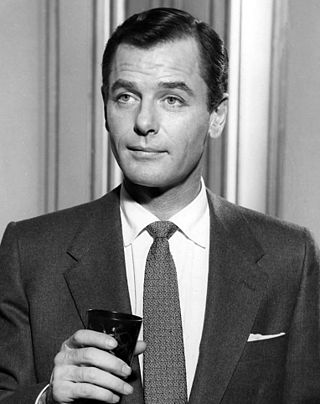
Gig Young was an American stage, film, and television actor.

Richard III is a 1955 British Technicolor film adaptation of William Shakespeare's historical play of the same name, also incorporating elements from his Henry VI, Part 3. It was directed and produced by Laurence Olivier, who also played the lead role. Featuring many noted Shakespearean actors, including a quartet of knights, the film depicts Richard plotting and conspiring to grasp the throne from his brother King Edward IV, played by Sir Cedric Hardwicke. In the process, many are killed and betrayed, with Richard's evil leading to his own downfall. The prologue of the film states that history without its legends would be "a dry matter indeed", implicitly admitting to the artistic licence that Shakespeare applied to the events of the time.

George Tobias was an American theater, film and television actor. He had character parts and supporting roles in several major films of Hollywood's Golden Age. He is also known for his role as Abner Kravitz on the TV sitcom Bewitched from 1964 to 1971.
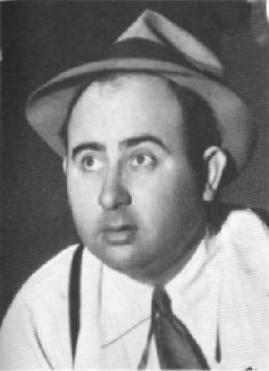
Norman Rae Taurog was an American film director and screenwriter. From 1920 to 1968, Taurog directed 180 films. At the age of 32, he received the Academy Award for Best Director for Skippy (1931), becoming the youngest person to win the award for eight and a half decades until Damien Chazelle won for La La Land in 2017. He was later nominated for Best Director for the film Boys Town (1938). He directed some of the best-known actors of the twentieth century, including his nephew Jackie Cooper, Spencer Tracy, Mickey Rooney, Judy Garland, Deanna Durbin, Fred Astaire, Gene Kelly, Deborah Kerr, Peter Lawford, Dean Martin, Jerry Lewis, Elvis Presley and Vincent Price. Taurog directed six Martin and Lewis films, and nine Elvis Presley films, more than any other director.

Crash Dive is a World War II film in Technicolor released in 1943. It was directed by Archie Mayo, written by Jo Swerling, and starred Tyrone Power, Dana Andrews, and Anne Baxter. The film was the last for Power before assignment to recruit training, as he had already enlisted in the United States Marine Corps.

Lee Garmes, A.S.C. was an American cinematographer. During his career, he worked with directors Howard Hawks, Max Ophüls, Josef von Sternberg, Alfred Hitchcock, King Vidor, Nicholas Ray and Henry Hathaway, whom he had met as a young man when the two first came to Hollywood in the silent era. He also co-directed two films with legendary screenwriter Ben Hecht: Angels Over Broadway and Actors and Sin.
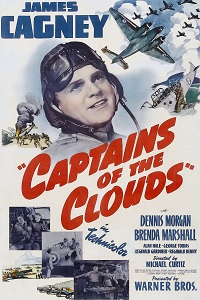
Captains of the Clouds is a 1942 American war film in Technicolor, directed by Michael Curtiz and starring James Cagney. It was produced by William Cagney, with Hal B. Wallis as executive producer. The screenplay was written by Arthur T. Horman, Richard Macaulay, and Norman Reilly Raine, based on a story by Horman and Roland Gillett. The cinematography was by Wilfred M. Cline and Sol Polito and was notable in that it was the first feature-length Hollywood production filmed entirely in Canada.

To the Shores of Tripoli is a 1942 American Technicolor film directed by H. Bruce Humberstone and starring John Payne, Maureen O'Hara and Randolph Scott. The film was produced by Darryl F. Zanuck. Its cinematography was nominated for an Academy Award in 1943.
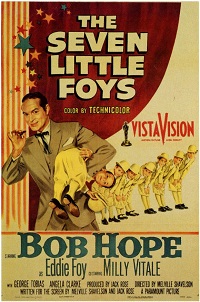
The Seven Little Foys is a Technicolor in VistaVision 1955 biographical musical comedy-drama film directed by Melville Shavelson starring Bob Hope as Eddie Foy. One highlight of the film is an energetic tabletop dance showdown sequence with Bob Hope as Eddie Foy and James Cagney as George M. Cohan. The story of Eddie Foy Sr. and the Seven Little Foys inspired a TV version in 1964 and a stage musical version, which premiered in 2007.

Taxi to the Dark Side is a 2007 American documentary film directed by Alex Gibney, and produced by Gibney, Eva Orner, and Susannah Shipman. It won the 2007 Academy Award for Best Documentary Feature. It focuses on the December 2002 killing of an Afghan taxi driver named Dilawar, who was beaten to death by American soldiers while being held in extrajudicial detention and interrogated at a black site at Bagram air base.

George Benton Turner was a United States Army soldier and a recipient of the United States military's highest decoration, the Medal of Honor, for his actions in World War II.

I Wanted Wings is a 1941 American drama film directed by Mitchell Leisen and based on a book by Lieutenant Beirne Lay Jr. The film stars Ray Milland and William Holden. The supporting cast includes Wayne Morris, Brian Donlevy, Constance Moore and Veronica Lake. I Wanted Wings features Lake's first major film role. Her career took off shortly thereafter; the same year, she starred in Sullivan's Travels. Lake would become one of the most popular and successful actresses of the early 1940s.
Hal Roach's Streamliners are a series of featurette comedy films created by Hal Roach that are longer than a short subject and shorter than a feature film, not exceeding 50 minutes in length. Twenty of the 29 features that Roach produced for United Artists were in the streamliner format. They usually consisted of five 10-minute reels.
References
- ↑ "The 14th Academy Awards (1942) Nominees and Winners". oscars.org. Retrieved June 25, 2013.
- ↑ Blau, Eleanor (July 22, 1987). "Richard Egan, Film Actor, Dies at 65". The New York Times.